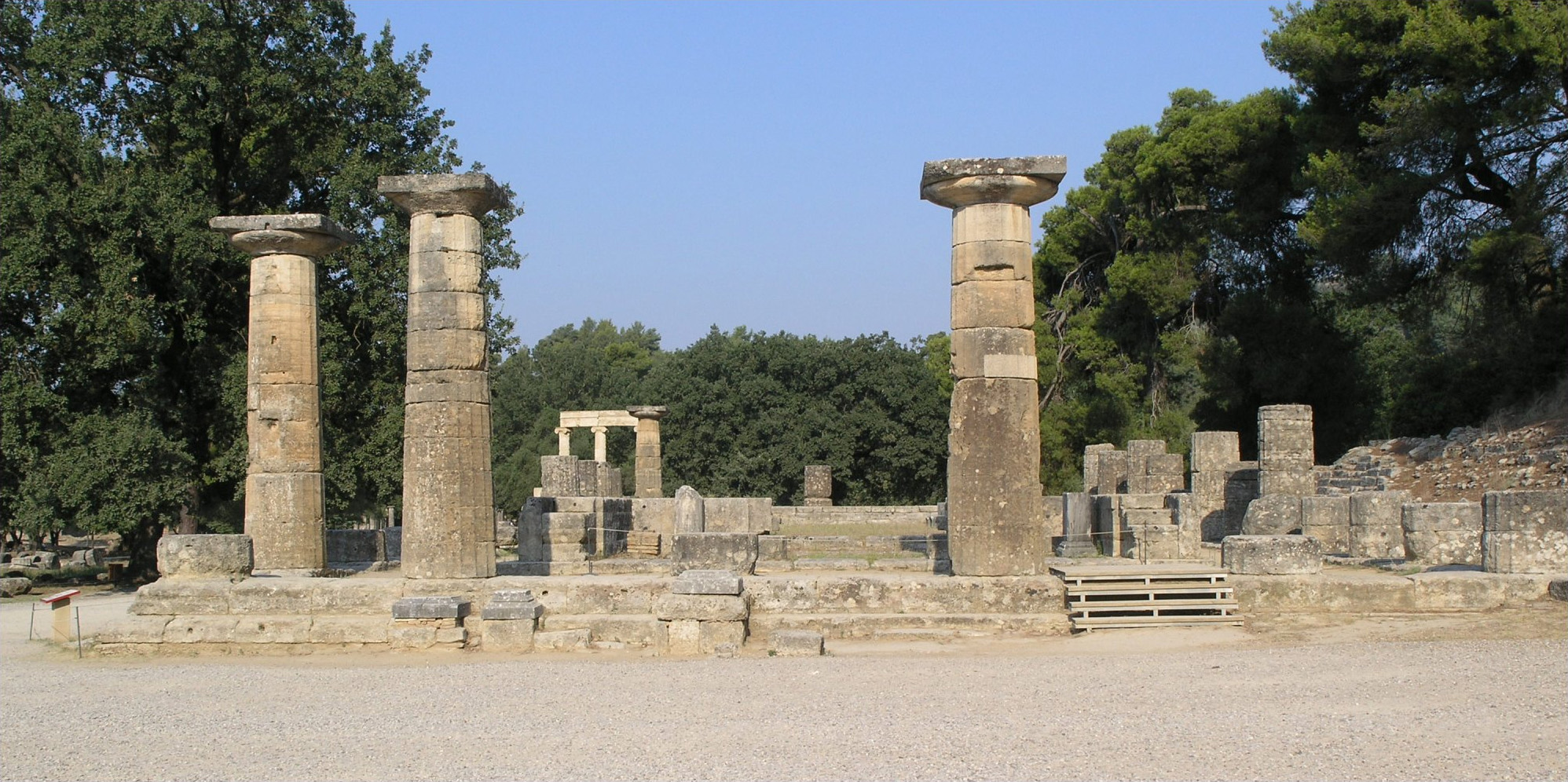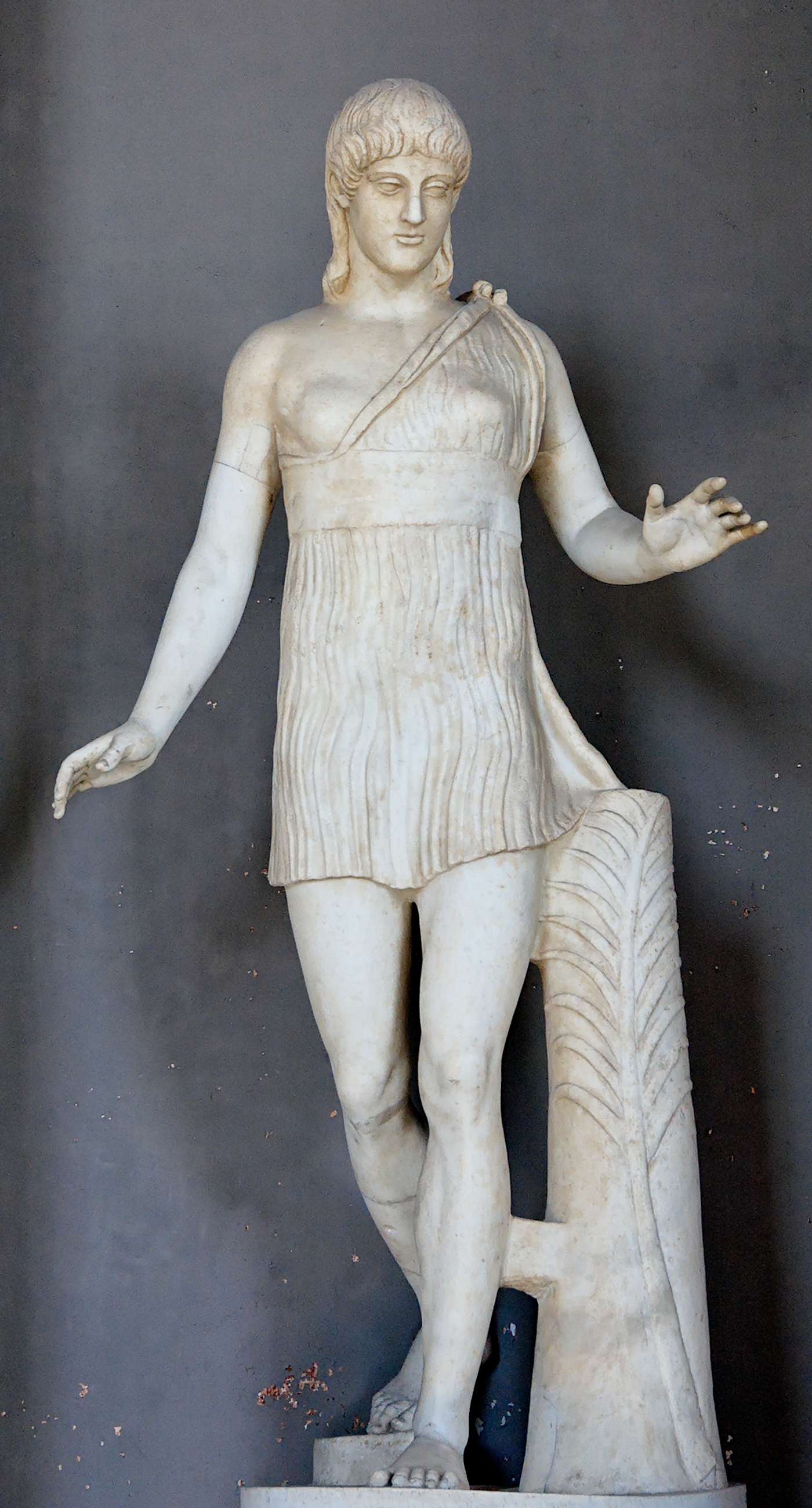Heraean Games on:
[Wikipedia]
[Google]
[Amazon]
The Heraea was an ancient Greek festival in which young girls competed in a footrace. The race was held every four years at Olympia, and probably took place around the same time as the
 Not much is known about the Heraea, but most of our knowledge comes from Pausanias' ''Description of Greece''. The date that the festival began is uncertain. Pausanias says that the games are (, "old"). There is evidence for cult activity in Olympia as far back as the tenth century BC, but the earliest cultic activity at the site appears to centre around the cult of Zeus; the cult of Hera was certainly in place by about 600 BC, when the first temple of Hera at Olympia was built. It is uncertain whether the races were an original feature of the festival, or a later addition. One story in Pausanias associates the sixteen women responsible for the Heraea with the conflict between
Not much is known about the Heraea, but most of our knowledge comes from Pausanias' ''Description of Greece''. The date that the festival began is uncertain. Pausanias says that the games are (, "old"). There is evidence for cult activity in Olympia as far back as the tenth century BC, but the earliest cultic activity at the site appears to centre around the cult of Zeus; the cult of Hera was certainly in place by about 600 BC, when the first temple of Hera at Olympia was built. It is uncertain whether the races were an original feature of the festival, or a later addition. One story in Pausanias associates the sixteen women responsible for the Heraea with the conflict between  The only event at the Heraean Games was the stadion, which was one sixth shorter than the equivalent men's race. Only ''parthenoi'' (unmarried young women) competed in the games. Competitors raced in three different age categories, though it is uncertain exactly how old the competitors were. They wore a distinctive outfit of a short
The only event at the Heraean Games was the stadion, which was one sixth shorter than the equivalent men's race. Only ''parthenoi'' (unmarried young women) competed in the games. Competitors raced in three different age categories, though it is uncertain exactly how old the competitors were. They wore a distinctive outfit of a short  The festival of the Heraea was presided over by a group of sixteen women, who as well as conducting the games were responsible for weaving a peplos for Hera and arranging choral dances in honour of Hippodameia and
The festival of the Heraea was presided over by a group of sixteen women, who as well as conducting the games were responsible for weaving a peplos for Hera and arranging choral dances in honour of Hippodameia and
ancient Olympic Games
The ancient Olympic Games (Ὀλυμπιακοὶ ἀγῶνες; la, Olympia, neuter plural: "the Olympics") were a series of athletic competitions among representatives of city-states and were one of the Panhellenic Games of Ancient Greece ...
.
Overview
 Not much is known about the Heraea, but most of our knowledge comes from Pausanias' ''Description of Greece''. The date that the festival began is uncertain. Pausanias says that the games are (, "old"). There is evidence for cult activity in Olympia as far back as the tenth century BC, but the earliest cultic activity at the site appears to centre around the cult of Zeus; the cult of Hera was certainly in place by about 600 BC, when the first temple of Hera at Olympia was built. It is uncertain whether the races were an original feature of the festival, or a later addition. One story in Pausanias associates the sixteen women responsible for the Heraea with the conflict between
Not much is known about the Heraea, but most of our knowledge comes from Pausanias' ''Description of Greece''. The date that the festival began is uncertain. Pausanias says that the games are (, "old"). There is evidence for cult activity in Olympia as far back as the tenth century BC, but the earliest cultic activity at the site appears to centre around the cult of Zeus; the cult of Hera was certainly in place by about 600 BC, when the first temple of Hera at Olympia was built. It is uncertain whether the races were an original feature of the festival, or a later addition. One story in Pausanias associates the sixteen women responsible for the Heraea with the conflict between Elis
Elis or Ilia ( el, Ηλεία, ''Ileia'') is a historic region in the western part of the Peloponnese peninsula of Greece. It is administered as a regional unit of the modern region of Western Greece. Its capital is Pyrgos. Until 2011 it was ...
and Pisa
Pisa ( , or ) is a city and ''comune'' in Tuscany, central Italy, straddling the Arno just before it empties into the Ligurian Sea. It is the capital city of the Province of Pisa. Although Pisa is known worldwide for its leaning tower, the ci ...
after the death of Damophon, tyrant of Pisa around 580 BC. If the festival were already established by this point, there may have been a re-organisation around this time (as there was at other Greek festivals in the late archaic period).
 The only event at the Heraean Games was the stadion, which was one sixth shorter than the equivalent men's race. Only ''parthenoi'' (unmarried young women) competed in the games. Competitors raced in three different age categories, though it is uncertain exactly how old the competitors were. They wore a distinctive outfit of a short
The only event at the Heraean Games was the stadion, which was one sixth shorter than the equivalent men's race. Only ''parthenoi'' (unmarried young women) competed in the games. Competitors raced in three different age categories, though it is uncertain exactly how old the competitors were. They wore a distinctive outfit of a short chiton
Chitons () are marine molluscs of varying size in the class Polyplacophora (), formerly known as Amphineura. About 940 extant and 430 fossil species are recognized.
They are also sometimes known as gumboots or sea cradles or coat-of-mail she ...
cut above the knees, which left the right shoulder and breast bare, and wore their hair loose. This outfit may have derived from the exomis, a variant of the chiton worn by labourers and associated with Hephaestus.
The winners were awarded a crown of olive leaves and a portion of a cow which was sacrificed to Hera. They were also permitted to dedicate statues inscribed with their name to Hera, though none of these statues survive.
 The festival of the Heraea was presided over by a group of sixteen women, who as well as conducting the games were responsible for weaving a peplos for Hera and arranging choral dances in honour of Hippodameia and
The festival of the Heraea was presided over by a group of sixteen women, who as well as conducting the games were responsible for weaving a peplos for Hera and arranging choral dances in honour of Hippodameia and Physcoa In Greek mythology, Physcoa ( Ancient Greek: Φυσκόα ''Phuskóa'') was a woman from the deme Orthia of Elis. She was credited with a variety of notable deeds, which are recorded in Pausanias' ''Description of Greece.''
Physcoa was believed to ...
. Pausanias gives two stories about these sixteen women. The first is that the Heraia was founded by Hippodamia and the first games were held to celebrate her marriage to Pelops
In Greek mythology, Pelops (; ) was king of Pisa in the Peloponnesus region (, lit. "Pelops' Island"). He was the son of Tantalus and the father of Atreus.
He was venerated at Olympia, where his cult developed into the founding myth of the O ...
, and she selected sixteen women to compete in the games. The second is that to settle a dispute between Elis and Pisa, the Eleans selected a wise elderly woman from each of sixteen ''polites'' in ancient Elis
Elis () or Eleia ( el, Ήλιδα, Ilida, grc-att, Ἦλις, Ēlis ; Elean: , ethnonym: ) is an ancient district in Greece that corresponds to the modern regional unit of Elis.
Elis is in southern Greece on the Peloponnese, bounded on t ...
to settle the dispute; these women were also given the responsibility of organising the Heraea.
The Heraean Games may have been puberty rites or pre-nuptial rituals. Matthew Dillon argues that as there were three different age categories for competitors, the ceremonies were unlikely to be associated with marriage. On the other hand, the races were associated with a mythological wedding, and other races between girls in ancient Greece (such as a footrace in honour of Dionysos held at Sparta, also described by Pausanias) seem to have been associated with pre-nuptial initiations.
References
Footnotes
Works cited
* * * * * *External links
{{commonscat-inline Ancient Greek athletic festivals Ancient Greek women Ancient Olympia Festivals of Hera Panhellenic Games Recurring sporting events established before 1750 Women's sports competitions Women's sport in Greece 6th-century BC establishments in Greece